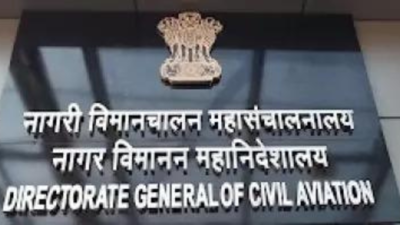ARTICLE AD BOX

NEW DELHI: Making the Directorate General of Civil Aviation (DGCA) a fully autonomous agency; mitigating fatigue among air traffic controllers (ATCO) and flight crew; modernising ATC and filling up critical staffing gaps in key organisations are among the 12 key issues that a parliamentary panel has flagged to “ ensure the continued safety and sustainable growth of India’s civil aviation sector.
” Coming in the backdrop of the AI 171 Ahmedabad crash, the report of the parliamentary standing committee on transport, tourism and culture has flagged issues that have been raised multiple times in the past also to no avail. Headed by JDU MP Sanjay Kumar Jha, the panel laid its report on the “overall review of safety in civil aviation sector” in both houses of Parliament Wednesday.The issues raised under 12 heads are:
DGCA
: The panel has recommended making the aviation safety regulator a financially and administratively autonomous agency in a time-bound manner.
“This is imperative to address critical technical staff shortages caused by an ineffective recruitment model… Autonomy is essential for the regulator to attract talent, set industry-commensurate salaries, and effectively enforce compliance in a rapidly expanding sector.
The (aviation) ministry's current stance is that direct recruitment by DGCA is not under consideration,” the report says.
Fatigue management for flight crew:
The MPs have sought “strict compliance with updated flight duty time limitation (FDTL) regulations for pilots and promoting mental health awareness and support for both flight crew and ATCOs.”
Both pilots and ATCOs in India have long complained of fatigue due to inadequate rest and erratic rostering.
Mitigating air traffic controller fatigue and staffing deficits:
The panel has recommended immediately developing a national fatigue risk management system (FRMS) for air traffic controllers (ATCOs) and acomprehensive staffing audit. “This is to end the long-standing and high-risk practice of seeking exemptions from mandatory duty time limitations. The current mismatch between recruitment and training capacity, coupled with operational overload, poses a direct and ongoing threat to airspace safety.
AAI acknowledges increasing workload… 1,636 additional ATCO posts have been created recently,” it says.
Strengthening surveillance and enforcement mechanisms:
The panel has recommended closing all safety deficiencies in a time-bound manner along with implementing stronger enforcement actions, including financial penalties for non-compliance. “This is a response to the significant and growing backlog of unresolved safety findings, which indicates a critical weakness in the post-surveillance rectification process that undermines the entire oversight program.
” It has also expressed concerns at DGCA’s “audit quality due to a lack of qualified staff and airlines prioritising profit over maintenance.”
Standardising safety protocols for helicopter operations:
The parliamentarians have sought a “uniform national regulatory framework for all state-operated helicopter services and mandatory, terrain-specific pilot training are recommended.” This summer saw a spate of helicopter accidents in Uttarakhand, following which the DGCA had taken action against some operators for alleged deficiencies.
The MPs have expressed concern at state level agencies managing operations in high risk environment, with limited central oversight.
Addressing recurring operational risks:
The panel has suggested detailed root-cause analysis for recurring “high risk” events like runway incursions. “Specific data on bird strikes and engine failures underscores the need for effective remedial measures despite existing systemic oversight.”
Modernising ATC:
The MPs have sought a time-bound plan to comprehensively overhaul of ATC automation systems and incorporating modern Al-driven tools. “The current systems are showing performance degradation and lack advanced safety features, increasing controller workload and compromising operational efficiency and safety in an increasingly complex airspace.”The other areas flagged include developing domestic maintenance, repair & overhaul (MRO) facilities, enhancing professional representation & governance and expanding pilot training infrastructure.



.png)
.png)
.png)
















 1 day ago
4
1 day ago
4









 English (US) ·
English (US) ·